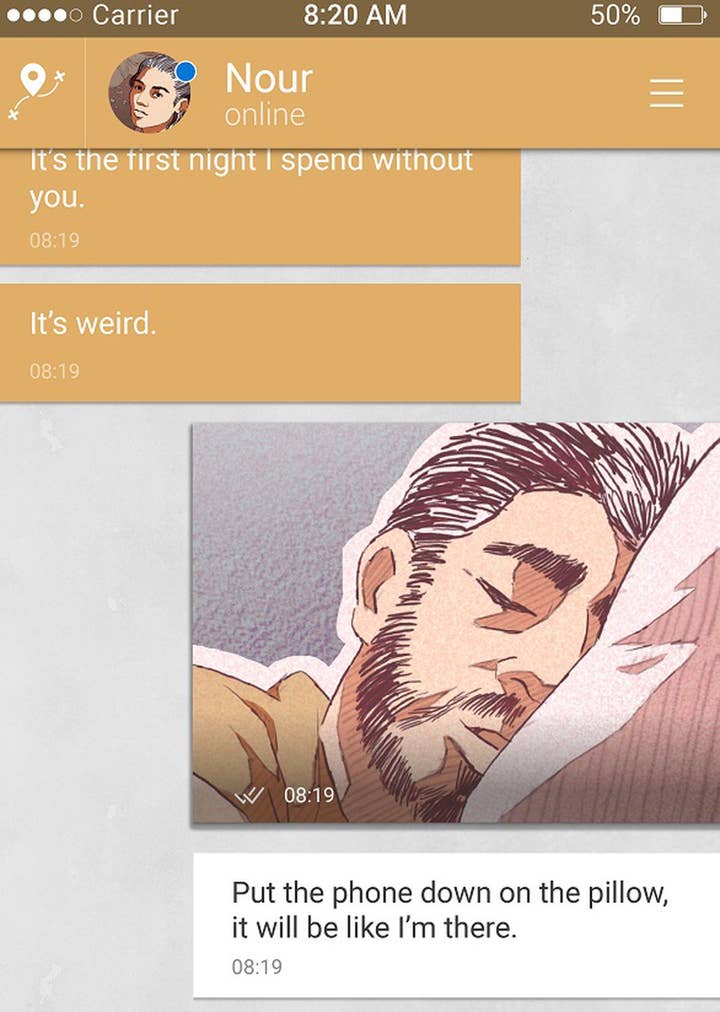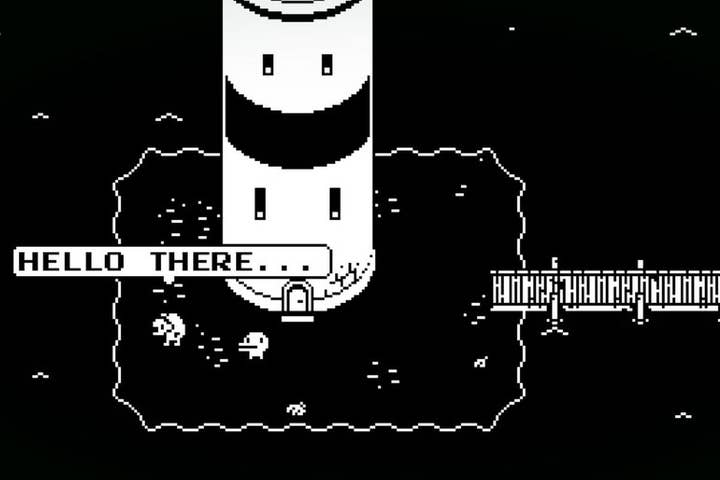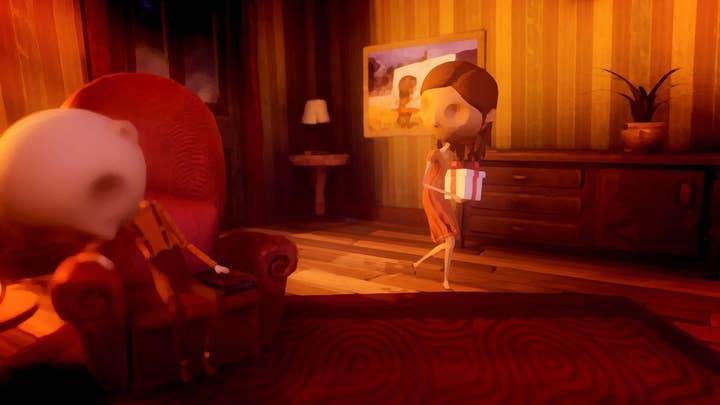How to write an authentic world
DLC: Creators of Bury Me My Love, Minit, and Last Day of June discuss writing challenges, subverting tropes, and a "generational shift" in the games industry
From time to time, there are interesting bits from our interviews that don't really fit well into the rest of the story, but are still worth reporting. Rather than relegate them to the trash bin of unpublished work, we'd like to repackage them into columns intended to provide additional insight on a variety of topics. While the exact format of these columns is still taking shape, we will publish them under the banner of 'DLC'.
The art of texting
Florent Maurin, CEO of Pixel Hunt, has acquired an unusual talent from his work on Bury Me, My Love. He's really good at writing text messages.
"Writing text messages is a special kind of literature," Maurin said. "You have to sound believable, and you have to be direct, and you have to use idiomatic phrases but not too much, and it's really complicated to get this right.
"I'm not the game's main author; Pierre Comine wrote 80% of the game and I wrote the last 20% of the game, but I learned a lot editing his copy. It was really interesting how he really managed to write text messages that felt like text messages and it's almost never forced. So I learned a lot narratively about this format and about how to write really specifically for the format you're using."

But for all his newfound expertise at text message writing, Maurin says that knowledge won't necessarily be applicable to his next project.
"My next game is completely different. It's about someone digging through her memories. One of the things I know is that I'm going to be very careful that the style will be completely different, because when you remember things it's not phrased in your head the same way you write text messages. I have to be careful. If I want the game to work narratively, the style in which I write the game is super important so the player will be involved."
There's a good reason why Maurin wants to distance himself from Bury Me, My Love for his next project. The premise of the game is a messenger app where you send texts to a woman named Nour who is fleeing from Syria, with your advice affecting her choices and, ultimately, the ending. To ensure the story was authentic, Maurin had to put in a considerable amount of research into a dark and difficult subject.
"Documenting for the story was really intense," he said. "I spent around four months reading articles, watching documentaries, reading testimonials and talking to Dana [the Syrian refugee whose story inspired and informed the game] over Whatsapp a lot. Those stories were unbelievably dreadful and dark, but also very important. As a European, as someone from France, we have thousands of migrants in the streets of France waiting for the administrative help to decide what to do with their lives. Their smartphones are so important to them, because it's the only thing they have left to connect with their families."
"It's a little too intense for me to just say, 'Okay, let's do another game using the smartphone with exactly the same game engine', for instance. I need some time to vent, I need some time to digest the story we told. Maybe in a year or two, I'll go back to another text message based game. But right now, my next project is not that at all. For me, right now, the text message game is Bury Me, My Love, and I want it to stay that way for a little bit longer before I can use this format again for another topic."
Brevity, and the soul of Minit
Like Maurin, Jan Willem Nijman faced a major challenge fitting the dialogue of his top-down, 2D adventure Minit into an unusual medium. But while Maurin struggled with authenticity, Nijman's fight was with the brevity required to make his game work.
Because each "run" of Minit only takes sixty seconds, dialogue was a tricky but necessary feature. Characters needed to convey necessary information to the player, but it needed to be concise enough they could read it and then act on it in the minute-long loop. And they had to do it in a way that was interesting and fitting with the game's personality.
"By the end of the project, we were getting to a point where we needed to finalize all the dialogue," Nijman said. "Every character in Minit is basically just one line of dialogue, another line when you hit them, and another line when you water them [Minit has a watering can item that can be used on just about everything]. The whole personality of every NPC in Minit is three lines of dialogue, so we needed that to be perfect in a way. It should be part of the story, it should be funny, but it should also help the players figure out where to go. That was a huge challenge, to say 'Okay, it's done now, we're happy with this'. It was really scary, in a way."

That feat grew even more challenging when it came time to localize the game.
"We had to have really specific notes, like, 'It doesn't really matter what this guy is saying but please use the same amount of characters because that's what the timing is based on.' In every language, the story is slightly different, but it always ends with the word that's the clue you need."
The whimsy of Minit's dialogue is just one part of the game's larger themes. Though the premise, like some of the dialogue, started off as a sort of joke, Nijman says the strange world of Minit allowed the team to approach classic gameplay and themes in fresh ways.
"What's interesting about Minit to me is that it uses a lot of video game tropes," Nijman said. "It starts by finding a sword on the beach. It looks like an old 2D Zelda game. But it was really fun to play with those expectations and tropes and use them to be funny. The whole game is about, 'Why would anyone pick up a cursed sword on the beach?' That's not a good idea, it's dangerous.
"Then some of the thematics of the game are also kind of grim. There's a whole hint system based on ghosts and there's skeletons spread around the world but if you solve a puzzle, instead of skeletons there are ghosts who give you cryptic hints to help you out. One of them is completely oblivious to being cryptic and straight-up tells you how to solve puzzles. It's something we played with a lot, but for most of the things in Minit, since it's mostly unique content, if something felt right with the world, if it was charming enough, we said, 'All right, this is part of the world now.' And we built from there."

Gaming's "generational shift"
In my interview with Ovosonico CEO Massimo Guarini, we talked at length about the expansion of video games to reach a wider audience. But while Guarini sees the industry broadening, he also sees its existing core of creators and audiences changing over time, something that he believes is having a profound effect on how games are made.
"I believe there's a new market emerging, and that's a market of people who are basically 40- or 50-years-old today," Guarini said. "This is the first time we're witnessing a generational shift in the industry. It's the first time in the history of video games that we have 60-year-old gamers, as well as creators. Even 70-year-old creators! Because we are getting older, but when we started, it was a bunch of 20- and 30-year-old creators making games for a 20-30-year-old audience. And today things are changing.
"It's inevitable that content is going to match the type of audience, and as the audience grows older, as creators grow older, we are witnessing a bunch of new content coming in. Think about That Dragon, Cancer. C'mon, it's the first time in history that someone makes a game about cancer! You couldn't expect that, right? For now, it's still an isolated case, but I expect these things to be much more present in the game industry, just as it happened with movies."
The topic of movies came up frequently in our discussion, as Guarini believes that gaming will someday become just as simple as the "Netflix button on your remote," something that will help games reach a wider audience than ever before. But for him, the comparison goes further. Games, he says, will evolve just like film and music did over time in content as well as technology, moving from straightforward, light-hearted entertainment to offering a rich range of experiences.
"If you recall movies before the big studio era and Hollywood, it was just a sort of technological gadget. Going to the cinema was a joke, it was a ten minute experience for a laugh - for rich people, by the way. And today you have all sorts of content, genres, and all sorts of human emotions are touched by movies. It's just a matter of time, we'll eventually get there."
